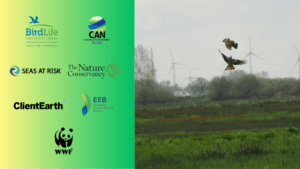To: Mr. Dan Jørgensen, European Commissioner for Energy and Housing
Cc: Ms. Jessika Roswall, European Commissioner for Environment, Water Resilience and a Competitive
Circular Economy; Energy Attachés
Brussels, 10 June 2025
Subject: Energy Omnibus – Keep Nature Directives Intact
Dear Commissioner Jørgensen,
We, the undersigned organisations, are writing to express our concern about the potential weakening of EU nature legislation in the context of the ongoing implementation dialogue on permitting and the EU simplification agenda. The current tendency to ‘simplify’ agreed legislation via omnibus procedures is very worrying, as the line between reducing administrative burden through simplification and outright deregulation is perilously thin. Reopening EU laws before implementation risks undermining public trust in institutions and weakening regulatory stability, bypassing the proper democratic process.
In particular, we are alarmed by the potential weakening of EU nature legislation through an energy omnibus. While we strongly support the urgent transition away from fossil fuels towards a 100% renewable energy system, we believe that any legislative revision should be based on a comprehensive and transparent impact assessment. In general, we believe the Commission must avoid reopening key legislative frameworks such as the Fit-For-55 package, REPowerEU or any existing nature legislation, in order to uphold the Union’s constitutional obligation to protect the environment and improve its quality.
As the Birds and Habitats Directives are the backbone of the EU environmental legal framework and crucial for addressing biodiversity loss, reopening them would generate legal uncertainty, and aggravate the climate and biodiversity crises. These directives are closely interlinked with the rest of the EU’s energy legislation, providing a stable policy base that supports clear and consistent permitting procedures, helping sustainable investments in the energy transition.
Environmental law is not the weak point of the permitting process. Delays are caused by other barriers and structural weaknesses, such as the shortage of qualified staff and Member States’ administrative capacity for proper planning and processing, and the lack of publicly available data. Moreover, we observe that no MS has fully transposed RED III, and the EU’s nature conservation and biodiversity targets are not on track to be met.
With sustained effort still needed to meet – and preferably exceed – the EU’s climate and energy targets, we urge the Commission to keep its focus where it is most needed: delivering tools for the proper implementation of RED III. There are well-established ways to accelerate permitting without weakening environmental protections:
• Supporting Member States and local governments in the implementation of RED III, including by digitalising permitting and environmental assessment procedures, designating suitable renewable energy areas upfront, including acceleration areas, through robust and science-based methodologies including sensitivity mapping, , and ensuring well-resourced permitting authorities via EU funding and training in line with the Commission Guidelines and RED III.5
• Providing targeted implementation support through tools such as the Accele-RES plan and the Technical Support Instrument (TSI), but also through an EU-wide public data platform for biodiversity and environmental information to improve project screening.
• Ensuring effective governance and compliance by rigorously monitoring national implementation, and launching enforcement and infringement procedures when necessary.
• Upholding public trust and environmental standards by ensuring early and transparent public participation with meaningful local community engagement and benefit-sharing, and protecting theintegrity of EU environmental law as a foundation for legal certainty and support.
Fast energy transition without compromising environmental protection is a shared goal across the board – from the renewable energy sector to civil society organisations. We urge the Commission to avoid weakening nature laws and focus on meeting climate, energy, and biodiversity targets together. As civil society, we stand ready to work with the Commission and Member States to speed up nature-friendly renewable deployment with speed, quality, and public support.




